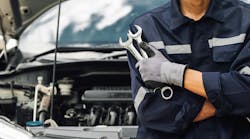This may sound crazy, I know, but like it or not you are not in the car business. Let’s listen to veteran ATI Coach Geoff Berman explain what he means by that statement:
Think about it. Has a car ever driven up to your front counter all by itself, looked you in the eye and said, “I’m here for my 8:30 oil service?” Have you ever seen a car pull up to a traffic light and turn to the car next to it and say, “Hey dude . . . you have to go to Jim’s Garage . . . they have the best tasting oil in town!” Cars don’t have feelings or emotions and they don’t make the decisions on the services they buy. This is not a Disney movie.
So what business are you in?
If you are thinking you are in the service business, you wouldn’t be wrong. The problem is that the service part of your business is only half the picture. There are two kinds of people that come to your business.
First, there are the people that trade their dollars for your service. These are the ones you think of when you relate to being in the service business and you call them your customers. The problem is that you tend to see customers as the ones who are most important to your business. I say we are putting the cart before the horse here.
|
LIMITED TIME OFFER: Scheduling Blueprint Checklist |
| Discover if your planning skills need improvement with this Scheduling Blueprint Checklist. Use this tool to help you adopt effective scheduling techniques that aim for the results you’re trying to achieve. Simply go to www.ationlinetraining.com/2019-11 for a limited time |
The other group of people who come to your business are the ones who trade their service for your dollars. You typically refer to these people as your employees. Employees are just as important as (you might even say more important than) customers. Employees provide the service experience that you want customers to have. Therefore, you should be more engaged with your employees to ensure they provide the expected experience to customers needing vehicle service. In other words, you can no longer ignore your employees and assume that because they get paid, they will always do the right thing. So instead of thinking you’re in the service business, a better way to look at this is: you’re in the “People Business.” Realize that all people matter. Not just customers.
Do you really know what you sell?
If you take a moment and consider the products and services you sell, the top three that come to mind are probably parts, labor and sublet. For most, the top two are parts and labor with sublet a far distant third. Of these top two revenue categories, you can boil them down to one that really matters. Without this one, the business cannot survive. It’s the glue that holds it all together — and when focused on, the other is almost certain to follow. In case you haven’t guessed it, it’s labor. What you sell is labor. Isn’t it labor that makes payroll? Without it you’re nothing but a parts store.
Have you ever had a day where the place was insanely busy? You were so busy in fact you could barely find the time to use the bathroom and neither could anyone else. You knew it had to be a great sales day. Then you looked at the deposits for the day and couldn’t believe how little was there.
On the other hand, have you had a day where it felt like you hardly worked? The work flowed smoothly and efficiently. It seemed as if everything just lined up nicely, and it did. As a result, you had great deposits that day, but it didn’t feel like you should have. Usually when I hear about these great days the shop owners tell me: “We had the right jobs that day. Everything just fell into place.” My answer is always the same: “Do you want that every day? Of course, you do. The solution is to focus on labor.”
If every car that came in only purchased an oil change, I think you would agree it would likely create an extremely busy and unprofitable day. That would be a shop focused on cars. The opposite is also true. If every job that day was an engine job, your “C” tech would have very little to do, and again, you would find yourself not making any money. The cars simply don’t matter. It’s the labor that does. Focus on the labor and the cars will always follow. Focus on the cars and the labor won’t be consistent. The biggest fix for this problem is adopting proper scheduling techniques that aim for the results you’re trying to achieve. Remember, where you finish your day has a lot to do with where you start your day.
If you want to have more days that flow well, then you must stop hoping or wishing for it to happen. It must be by design. Start strong and make it happen!
How do you get all of this done?
Now that you understand the importance of people and labor, you’re probably wondering how to make this a priority for everyone at your shop. While there are many things to consider, there is one that if you embrace it in the right way, and you become constant and relentless, you can’t miss. What I’m referring to is training. You must become a training company and every staff member must understand that you’re a training company, period! If you embrace the importance of training and you make your training completely about “people” and “labor” you will fill more of your labor inventory every single day. It really is that simple.
Take a courtesy check for example: is it about people or labor? If you said both you’re right. It builds trust with your customers and sells more labor. What about thank you calls: is it people or labor? People, right? Who doesn’t like a sincere thank you? And last, what about exit appointments: people or labor? You can easily see how it impacts both. Examples of other services that affect both categories are customer walk arounds, proper road testing before and after the service, proper parts handling, and quality control processes. They all impact people and labor. If there is ever anything that you want to change, and that change isn’t about people or labor, it probably shouldn’t be a high priority.
Never forget this!
Nothing I said here will matter if you don’t understand the importance of communication. Simply put: “communication equals production.” If you have strong production, you have strong communication. If you have weak production, you have weak communication. There is a direct link between communication and overall production. Often, shop owners tend to look at the technician as the production issue. While that may be part of the case, more than likely there are many factors at play here that the technician has very little or no control over.
If the customer does not respond to the sales call for three hours, what does that do to production? It’s easy to blame the customer. However, what if you pointed your finger at yourself instead? What if everyone did that? Instead of immediately blaming the customer, ask yourself and your staff, “What can we do to improve communication with our customer . . . how can we guarantee they will be there when we call?” Questions like this encourage ideas, not excuses. You might discover answers like this: tell the customer we are going to call them between 10 a.m. and 11 a.m. to review what the vehicle needs, and remind them that this conversation ensures the best chance they’ll get their vehicle back today. You’ll find that it really isn’t that hard to find solutions to your challenges if you ask the right questions.
What about how you communicate with the parts suppliers? Do you open the packages and look at the parts while the driver is still standing there, or do you wait until you are ready to install them? How you communicate with the parts suppliers impacts production too. Does this impact people or labor?
What about the estimate itself? Does your service professional review the estimate with your technician before the customer is called? If they did, wouldn’t the chance of time being missed on the repair order be less likely, and could turn a three-hour job into a four-hour job? How you communicate with your technician impacts production also. What you sell is labor!
Conclusion
Just to recap, there are five rules you need to remember if you want to get everyone focused on the same goals and moving down the right path together:
- Cars don’t matter: If you focus on labor the cars must follow.
- You’re in the people business: Employees are more important than the customers. Thinking this way will guarantee the customer is taken care of exceptionally because your employees want to, not because they have to.
- What you sell is labor: Labor is the glue that holds it all together. When you sell labor, parts will almost always follow.
- You’re a training company, period: Make sure training is a number one priority and that it reinforces prioritizing people and labor. Be constant and relentless in how you train.
- Communication = Production: How you communicate with everyone impacts production, which impacts labor. Always ask yourself and your staff how communication can be improved. There is always a way to make it better. Every challenge you face can be tracked back to communication in some way, shape, or form.
Are you controlling your day or is your day controlling you? If you’re tired of reacting to issues and putting out fires daily, then you’re probably failing to plan appropriately. Discover if your planning skills need improvement with this Scheduling Blueprint Checklist. Use this tool to help you adopt effective scheduling techniques that aim for the results you’re trying to achieve. Simply go to www.ationlinetraining.com/2019-11 for a limited time. Remember, where you finish your day has a lot to do with where you start your day.

